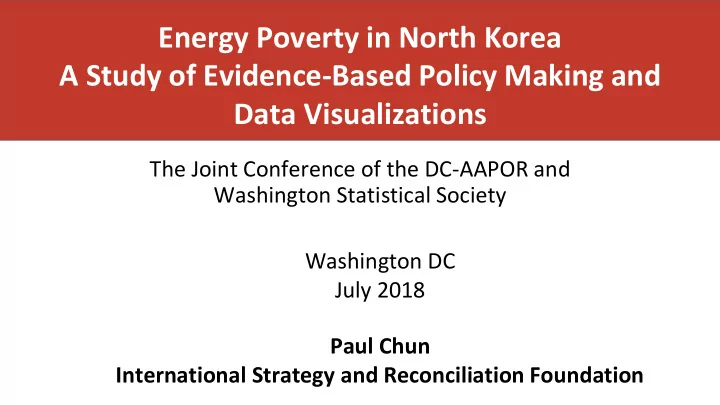

Energy Poverty in North Korea A Study of Evidence-Based Policy Making and Data Visualizations The Joint Conference of the DC-AAPOR and Washington Statistical Society Washington DC July 2018 Paul Chun International Strategy and Reconciliation Foundation
Acknowledgement of Research Co-authors Giang Nguyen (University of Iowa) Helene Cho (University of Pennsylvania) Clara Kyung (McGill University) Jun Bin Lee (UC Berkeley) Asaph Young Chun (U.S. Census Bureau) Note: All authors are affiliated with the International Strategy and Reconciliation Foundation.
Outline Introduction ● Research questions ● Methodology: data visualization and evidence-based ● policymaking Background ● Definition of energy poverty; Impact of energy poverty ● Findings and discussion ● Conclusion ●
Introduction “ The worst kind of poverty is energy poverty” Nighttime view of the Korean Peninsula on September 24, 2012 (NASA)
Research Purpose Investigate Energy Poverty North Korea as a Case Study
Research Questions ● Demand for energy across North Korea? ● Supply of energy in North Korea, in comparison to other countries? ● Energy poverty’s impact on health and development? ● Policy recommendations to address North Korea’s energy poverty?
Methodology ● Five main sources of data: ○ DPRK Census Data (2008) ○ DPRK Nutrition Survey Data (2012) ○ International Energy Agency’s data on electricity production (1990 -2014) ○ International Energy Agency’s World Energy Outlook 2016 (data for year 2014) ○ United Nations’ Millennium Development Goals Indicators (1990 -2015) Develop DVs to illustrate energy usage and the impact of energy ● poverty in North Korea.
Definition of Energy Poverty Energy poverty: “the absence of sufficient choice in accessing adequate, affordable, reliable, high-quality, safe and environmentally benign energy services to support economic and human development”. Reddy (2000)
Impact of Energy Poverty on Health Care Facilities ● Health care facilities need electricity to function: ○ Lighting ○ Storage of medication ○ Operation of technology such as X-ray and ultrasound ○ Transportation of patients
Data Visualization to Answer Research Questions Visualizations to illustrate the current situation of energy poverty and its consequences, with a focus on North Korea
Access to Energy in North Korea, Compared to Developing Regions in the World Link
Implications for Policymakers ● Burning wood and crop is widely used ○ Serious consequences for health and the environment ● Help expand the choices of energy resources for North Korea
Percentage of Population with Access to Electricity Link to interactive DV
Implications for Policymakers ● Improve electrification rate for North Korea ● Case study of countries prone to electricity shortage ● Focus on rural areas
Case DV 2 Energy Demand and Energy Supply in North Korea
Energy Demand and Supply Energy Demand and Supply Link to interactive DV
Case DV 3 Consequences of Energy Poverty in Health, Environment and Social Development
Link to interactive DV
Link to interactive DV
Link to interactive DV
Link to interactive DV
Link to interactive DV
Implications for Policymakers ● Consequences of energy poverty: ○ Correlation with forest degradation and social development ● Case study of countries prone to electricity shortage ○ Other countries with more pressing needs
Conclusions ● Merits and drawbacks of data visualization for energy policy development ● Visual tool to aid data analytics ● Missing data ● Correlation is not causation ● Future research agenda ○ Case studies for other countries in transition
Thank you! Please send questions and comments to Paul Chun paulchun08@gmail.com International Strategy and Reconciliation Foundation www.ISR2020.org
Recommend
More recommend